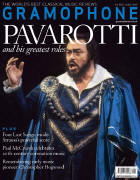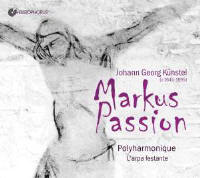Texte paru dans: / Appeared in: |
|
|
Outil de traduction (Très approximatif) |
|
|
Reviewer:
David Vickers The Franconian organist Geor Künstel (ca. 1645-1695) worked as a schoolteacher in Ansbach and later became court organist and then Kapellmeister in Coburg. The three parts of his St Mark Passion were divided across church services on Maundy Thursday (morning and afternoon) and Good Friday – a tradition that continued in Coburg for some years after the composer’s death. Plangent choruses and dulcet chorales benefit from Polyharmonique’s sophisticated harmonic shaping and crystalline diction – particularly in Jacobus Handl Gallus’s funerary motet Ecce quomodo moritur justus, incorporated midway through the last part of the Good Friday music. Numerous brief arias, duets or other ensembles are sung with stylistic acumen and fluency. The 11 solicitous singers are experts, including tenor Hans Jörg Mammel (an impeccable Evangelist), bass Felix Rumpf (a serene Jesus), countertenor Alexander Schneider and soprano Magdalene Harer – all alumni of groups such as Cantus Cölln, Collegium Vocale Gent, Hans-Christoph Rademann’s Schütz project and so on. L’Arpa Festante’s single strings, archlute and organ provide expressive accompaniments and fleeting five-part ritornellos that connect succinct elements together. From the evidence offered by this masterful performance, the solemn Italian-infused Lutheran style of Künstel’s music brings to mind Buxtehude – with a little less memorable genius for profound impact, although there are occasionally moments of dramatic energy, such as the contrapuntal tension of the crowd shouting ‘Kreuzige ihn!’, and several of the concise melodious duets are endearing (especially the soprano duet ‘Schlaf wohl’, sung after the burial). The intrepid Christophorus label deserves plaudits for yet another musically accomplished foray into the remoter byways of 17th-century German sacred music, although the lack of an English translation of the libretto suggests that not much interest outside Germany is anticipated. |
|




